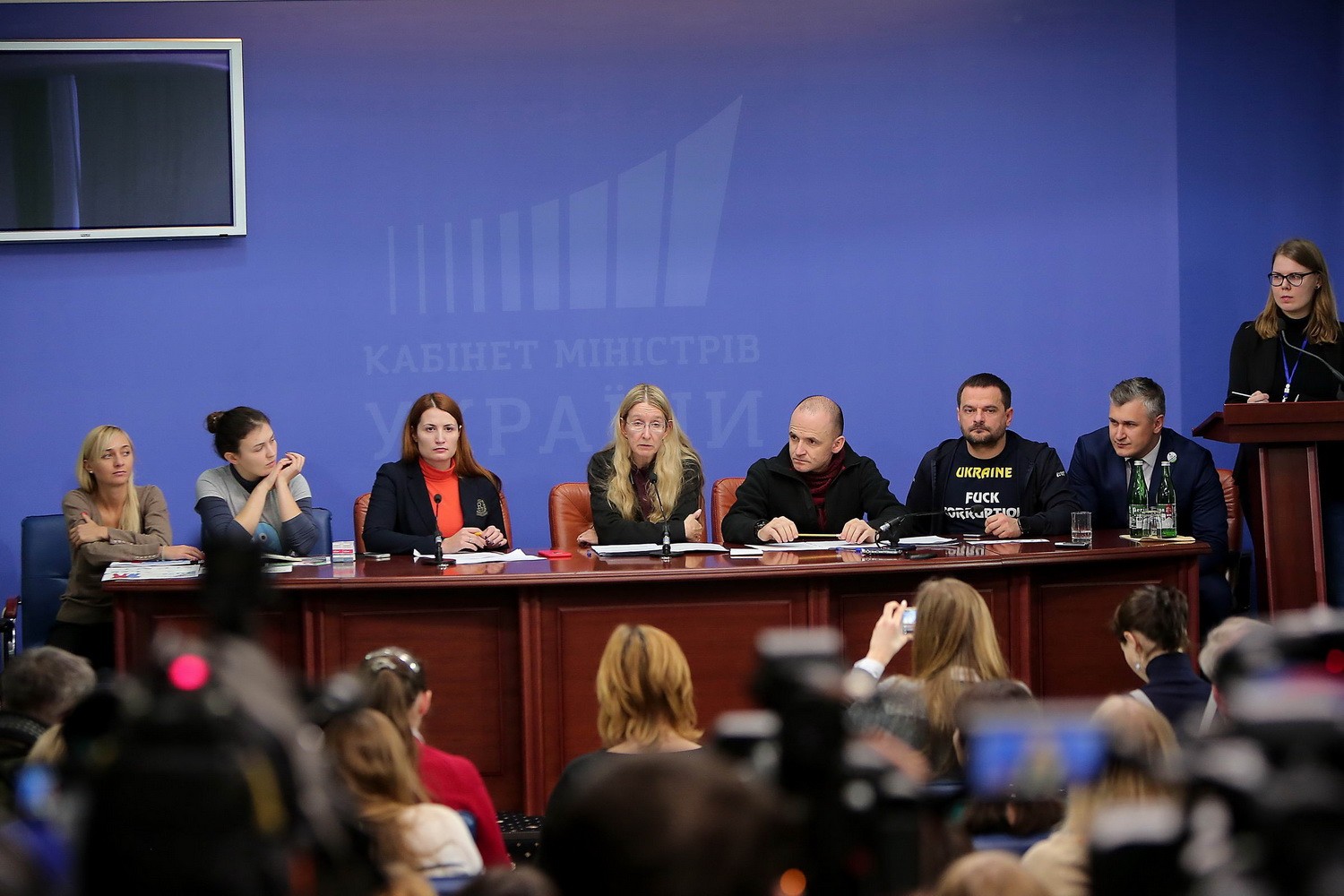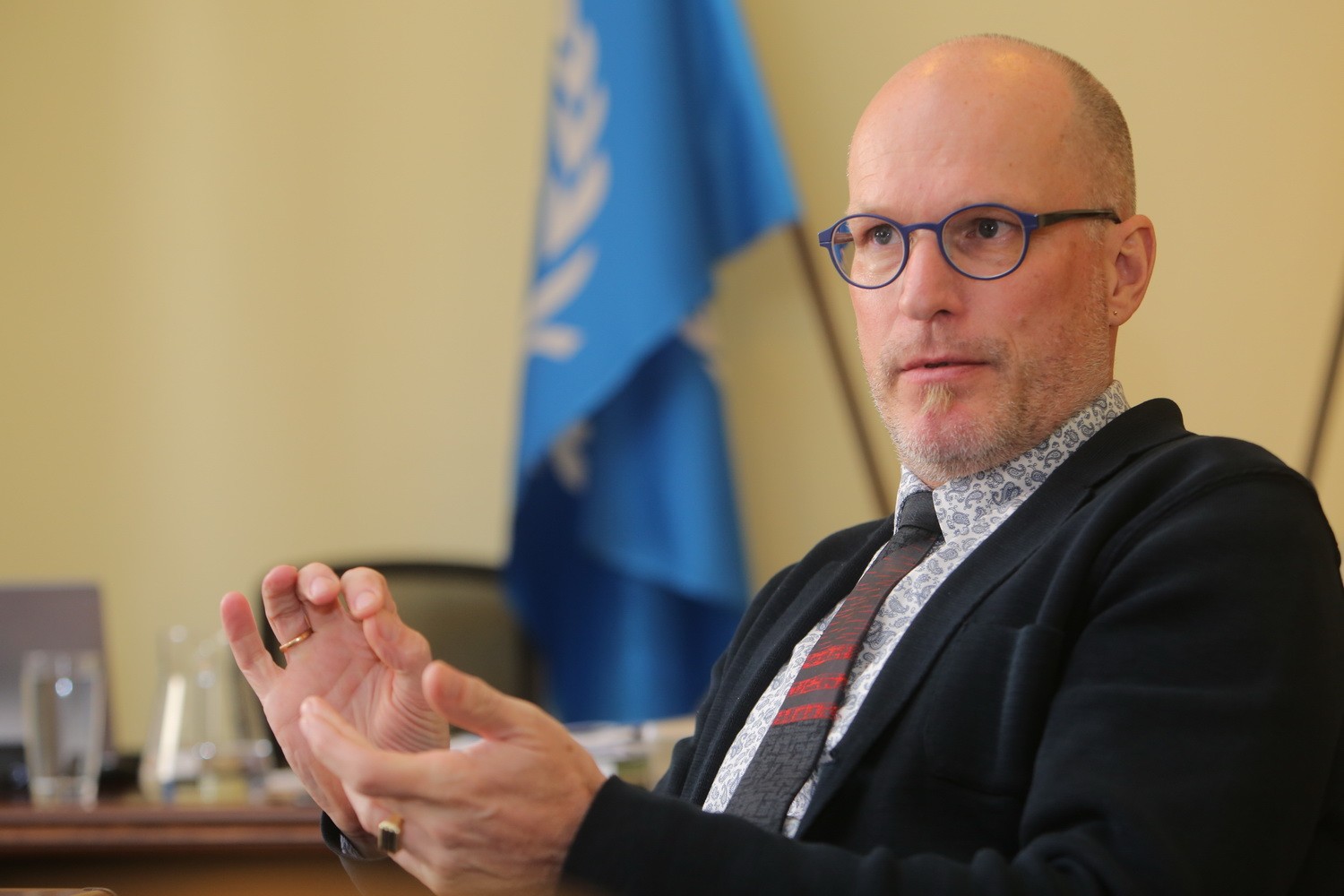This year, for the first time in independent Ukraine’s history, the country’s citizens have every chance of getting the medication they require, in the right amounts, and in good time.
For this, Ukraine’s biggest patients’ organizations credit Ulana Suprun, a U.S.-Ukrainian who has headed the Health Ministry in an acting capacity since July.
The country’s notoriously corrupt medicine procurement procedures, which were finally reformed under her, are now saving Ukraine millions of dollars per year, as well as saving time spent on obtaining vital medicines, and ultimately saving lives.
And with this, Ukrainian health care, which has for decades been one of the most graft-ridden areas of the public sector, is finally showing signs of healing.
But the battle isn’t over: entrenched interests are fighting back, accusing Suprun of mismanagement.
Old schemes
Until 2015, Ukraine’s Health Ministry was in charge of drug procurement for all of Ukraine’s nearly 2,000 state hospitals. The procurement budget is worth up to $250 million per year.
But usually, only a very few companies, and often the same ones, competed to supply the medications.
The winning companies would then buy drugs abroad, but only after reselling them through a chain of affiliated companies to artificially increase the final price for the Ukrainian market.
Olga Stefanyshyna, the executive director of the non-government organization Patients of Ukraine, says that many Ukrainian companies used similar schemes.
“Ukrainian legislation forbids the sale of medications to the Health Ministry at a price that exceeds 110 percent of the one declared on import,” Stefanyshyna explains. “So they, let’s say, were buying a pill in India for one dollar, reselling it (abroad) for $10, importing it, and then the company could sell the pill to Ukraine for $11.”
According to Ukraine’s patients’ organizations, about 40 percent of the funds allocated for drugs procurement was wasted each year through graft, the money ending up in the pockets of the drugs importers, and in those of officials in the form of kickbacks.

Ulana Suprun, acting health minister of Ukraine, talks to reporters during the joint press conference with the representatives of Ukraine’s biggest patients’ organizations on Jan. 18. (Government)
According to Stefanyshyna, until 2015, medication tenders in Ukraine were held for “a closed club of monopolists.”
Stefanyshyna said that although in 2014 about 6,500 companies were registered in Ukraine as distributors of medications, there usually were no more than 10 companies participating in all the tenders in each particular segment, like AIDS, tuberculosis, or oncology.
Moreover, even those 10 companies in reality would belong to the same two or three owners.
“These people were sharing the budget pie between themselves,” Stefanyshyna says.
According to Stefanyshyna, one of those companies was the Kyiv-based Ludmyla Pharm. The company had been selling Triptorelinum, a medication used to treat cancer, to the Health Ministry in 2014 for $293.56 per bottle. Next year Ludmyla Pharm had to sell the same medication to the Health Ministry through a British procurement agent, Crown Agents, and the price dropped to $214.99 per bottle.
Ludmyla Pharm has also been selling Imatinib, another medication to treat cancer, to Crown Agents in 2015 and 2016 for $3.77 per bottle. At the same time, Ludmyla Pharm kept selling Imatinib to the Ukrainian Institute of Blood Pathology and Transfusion Medicine for $5.54 per bottle. Ukraine’s Blood Pathology and Transfusion Medicine is subordinate to the Science Academy, not to the Health Ministry.
Ludmyla Pharm’s press service denies all accusations of corruption and price gouging.
International procurement
To break the graft cycle, anti-corruption activists together with patient organizations urged the Ukrainian parliament to pass legislation that would allow the Health Ministry to delegate procurement of drugs, vaccines and medical equipment to international organizations.
The proposed organizations included the United Nations Development Programme, the United Nations Children’s Fund and Crown Agents, owned by the British non-profit Crown Agents Foundation.
The Verkhovna Rada passed the vital law in March 2015, but it took the government another eight months to design all the necessary mechanisms and adopt regulations to make the new bill work. So international procurement only really got rolling at the end of 2015.
The results of the first year showed good progress, Stefanyshyna says. New international producers participated in tenders, boosting competition. Consequently, the old distributors had to become more modest, and supply drugs at lower prices to retain business.
For example, back in 2014 a Ukrainian distributor Ukroptpostach used to supply Binokrit, a cancer medication, to the Health Ministry for $322.60 per unit. However, in 2015 Ukroptpostach sold the same medication, produced by the same German company, to the international organizations carrying out procurement for the ministry at a price three times cheaper – $104.37.
Overall, in 2015 Ukraine saved Hr 620 million ($23 million) compared to the 2014 prices.
“Procurement through international organizations means more medication for people,” Stefanyshyna said. For some, it means finally getting the vital medicines they need.
Rare disease
Doctors diagnosed Mykyta Kartashov with mucopolysaccharidosis, a rare metabolic disorder, in 2015, when he was five. To live a normal life, he needs to be put on an intravenous drip three times a week. Without medicine, intravascular pressure increases, his liver, and spleen become enlarged, and his bones start deforming.
His family, however, can’t afford the medicine, his mother Alyona Kartashova told the Kyiv Post. One bottle of Elaprase, the medication that he needs, costs more than $4,000 and is only enough for one procedure. It is not available in an ordinary pharmacy. The Health Ministry buys the drug abroad and provides patients with it.
Kartashova applied for the vital medication for her son as soon as she heard of the diagnosis. A year passed before she was lucky enough to receive some – not from the ministry though, but from another child who left the country and did not need his medicine anymore. There was enough to last three-and-a-half months.
In September 2016, the family was supposed to receive the medicine from Health Ministry, but there wasn’t any. So they waited.
“His condition worsened,” Kartashova says. “He started walking on tiptoes, and had problems with his adenoids.”
The medication was supplied to Ukraine early in 2017, after international organizations procured it for Ukraine for the first time.
Today, Kartashov has been on his medication for some two months and is back to normal.
The United Nations Development Programme, which procured Elaprase for Ukraine in 2016, says it managed to buy the medication for patients with mucopolysaccharidosis at a price $1.1 million cheaper than it cost Ukraine in 2015.
Doctor vs. minister
But not everyone is happy with the improvements to the drug procurement system, and in January, the Health Ministry team suffered its biggest attack by critics yet.
It started when Borys Todurov, a reputable heart surgeon who heads the Heart Institute in Kyiv, accused Suprun of negligence that, in his words, has led to thousands of patients’ deaths. He said that the ministry had failed to hold some drug procurement tenders.
The surgeon offered no proof, but was supported by many of his former patients, experts, and other doctors.
Todurov also blamed the Health Ministry for not providing his institute with the planned supplies of medicines and equipment, as well as for not allowing him to open new branches of his institute.
Suprun denied the accusations and said procurement was going as planned.
The exchange led to a weeks-long public discussion, with many civic activists siding by the health ministry and the reform of procurement, which Todurov criticized.
“The reform works, it takes the money away from those (involved in corrupt schemes), and they are losing crazy big money,” Stefanyshyna said. “So now they’re trying to bury the reform completely.”
Long way to go
Janthomas Hiemstra, the country director of United Nations Development Program in Ukraine, said that all the fuss over procurement through international organizations means that lots of people are losing money and are not happy with the new rules.
“Every year Ukraine spends probably more on health care than most countries in the region,” he says. “However, the life expectancy of Ukrainian people is 10-15 years lower than in other countries. I have to admit that over decades, investment in the health sector has been dissipating.”
He praised Ukraine for admitting the problem and inviting “fresh parties,” not involved in the system, to help with procurement. However, this is just a beginning of what has to be done, he said.
He said Ukraine has to create a state institute to buy medicines for the entire country.
“We do not intend to procure medicine forever, that is not our role, it’s just to give the country opportunity to think, to put something new in place,” he said.
Suprun said the working group under the Health Ministry has already started working on the procurement body, which is expected to be launched by 2019.

Janthomas Hiemstra, the country director of United Nations Development Program in Ukraine, talks to the Kyiv Post reporter in the UNDP office in Kyiv. (Volodymyr Petrov)
Hiemstra also noted that there are a number of the medications on the government’s list of drugs for procurement that are outdated and should be substituted with newer ones, but some of them are specified in legislation.
Oleksandra Ustinova, a board member at the Anti-Corruption Action Center, also named several problems Suprun’s team still has to resolve in terms of reforming the health care system.
One of them is the bureaucratic process of licensing new drugs for import. Another is the huge amount of labs that belonged to the corrupt sanitary-epidemiological inspection, a service that has now been deprived of most of its powers. Now, the Health Ministry needs to perform a major restructuring to find a place for about 800 idle labs in the new system. As of now, they are still financed from Ukraine’s budget, but “nobody knows who uses the results of the research, and for what,” according to Viktor Liashko, head of non-government organization Infection Control.
Ustinova also said that Ukraine spends the largest share of its health budget on financing state hospitals, which is ineffective, since it is proportional with the number of beds.
Oleksandr Bablyak, a cardiac surgeon from Dobrobut, a Ukrainian chain of private clinics, also said that many of Ukraine’s state hospitals have been prolonging their patient’s stays to justify bigger financing for the clinic. Bablyak spent 23 years working in state health care, but says he had to leave, as he couldn’t perform at his best within the limitations of the state healthcare system, with its lack of financing and equipment.
“If a patient who had a surgery can be sent home in seven days or in 14, and the hospital has not that many patients, then the patient might stay for a longer period,” Bablyak said. “But the number of people effectively treated won’t grow in this way.”
Suprun plans to reform the system in a way that allows “money to follow the patient,” with hospitals getting more financing should more patients obtain treatment there.
However, most of the changes that the new team at the Health Ministry needs to implement will depend on Ukraine’s parliament, Ustinova said. And considering previous experience, there is a risk that it won’t be easy. For now, Ustinova added, Suprun’s team is trying to resolve problems with the ministry’s decrees and bylaws to get as far as they can on their own.
“We can only hope there will be enough political will to adopt this legislation,” Ustinova said.
